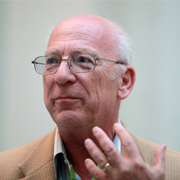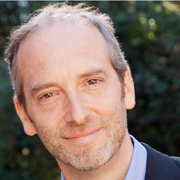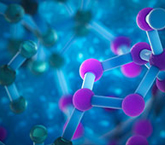Scientific Advisory Board

Barry M. Trost
Tamaki Professor of Humanities and Sciences
Department of Chemistry
Stanford University
Trost Group Website
Born in Philadelphia, Pennsylvania in 1941 where he began his university training at the University of Pennsylvania (BA, 1962), he obtained a Ph.D. degree in Chemistry just three years later at the Massachusetts Institute of Technology (1965). He directly moved to the University of Wisconsin where he was promoted to Professor of Chemistry in 1969 and subsequently became the Vilas Research Professor in 1982. He joined the faculty at Stanford as Professor of Chemistry in 1987 and became Tamaki Professor of Humanities and Sciences in 1990. In addition, he has been Visiting Professor of Chemistry in Germany (Universities of Marburg, Hamburg and Munich), Denmark (University of Copenhagen), France (Universities of Paris VI and Paris-Sud), Italy (University of Pisa) and Spain (University of Barcelona and Santiago de Compostela). In 1994, he was presented with a Docteur honoris causa of the Université Claude-Bernard (Lyon I), France, and in 1997 a Doctor Scientiarum Honoris Causa of the Technion, Haifa, Israel. He was appointed an Honorary Professor at the Shanghai Institute of Organic Chemistry in 2006 and received the Ulysses Medal from University College Dublin in 2013.
Professor Trost’s work has been characterized by a very high order of imagination, innovation, and scholarship. He has ranged over the entire field of organic synthesis, particularly emphasizing extraordinarily novel methodology which he translates to more efficient total synthesis of complex bioactive compounds. In recognition of his many contributions, Professor Trost has received a number of awards, including ACS Award in Pure Chemistry (1977), ACS Award for Creative Work in Synthetic Organic Chemistry (1981), Baekeland Award (1981),), Arthur C. Cope Scholar Award (1989), Guenther Award in the Chemistry of Essential Oils and Related Products (1990), Dr. Paul Janssen Prize (1990), ASSU Graduate Teaching Award (1991), Bing Teaching Award (1993), ACS Roger Adams Award (1995), Presidential Green Chemistry Challenge Award (1998), Herbert C. Brown Award for Creative Research in Synthetic Methods (1999), Belgian Organic Synthesis Symposium Elsevier Award (2000), Nichols Medal (2000), Yamada Prize (2001), ACS Nobel Laureate Signature Award for Graduate Education in Chemistry (2002), ACS Cope Award (2004), John Scott Award of the city of Philadelphia (2004), Thomson Scientific Laureate (2007), Nagoya Medal (2008), Israel Chemical Society Excellence in Medicinal Chemistry Award (2013), Ryoji Noyori Prize (2013), German Chemical Society’s August-Wilhelm-von-Hofmann Denkmuenze (2014) and International Precious Metal Institute Junichiro Tanaka Distinguished Achievement Award (2014). Professor Trost has been elected a fellow of the American Academy of Sciences (1992) and a member of the National Academy of Sciences (1990). He has published two books and over 930 scientific articles.

John F. Hartwig
Henry Rapoport Professor of Chemistry
Department of Chemistry
University of California at Berkeley
Hartwig Group Website
John F. Hartwig was born in 1964 in Illinois, and was raised in upstate New York. He received a B.A. degree in 1986 from Princeton University and a Ph.D. degree in 1990 from the University of California, Berkeley under the collaborative direction of Robert Bergman and Richard Andersen. After an American Cancer Society postdoctoral fellowship with Stephen Lippard, he began an appointment at Yale University in 1992, where he was an Assistant Professor, Associate Professor, and then full Professor until 2004. In 2004, he was named the Irénée P. DuPont Professor of Chemistry. In August of 2006, Professor Hartwig moved to the University of Illinois Urbana-Champaign, where he was named the Kenneth L. Rinehart Jr. Professor of Chemistry. In August 2011, Professor Hartwig moved to his current position on the faculty at the University of California, Berkeley, where he is the Henry Rapoport Professor of Chemistry and a Senior Faculty Scientist at Lawrence Berkeley National Laboratory.
Professor Hartwig's research focuses on the discovery and understanding of new reactions catalyzed by transition metal complexes. He has developed a selective catalytic functionalization of alkanes, a method for formation of arylamines and aryl ethers from aryl halides or sulfonates, a method for the direct conversion of carbonyl compounds to α-aryl carbonyl derivatives, systems for the catalytic hydroaminations of alkenes, vinylarenes and dienes, highly enantioselective and site-selective catalysts for the regio- and enantioselective amination of allylic carbonates, copper complexes that mediate the fluorinations of aryl halides, copper reagents for the fluoroalkylation of aryl halides, and both homogenous and heterogeneous catalysts for the hydrogenolysis of the linkages in lignin without arene reduction. With each system, his group has conducted extensive mechanistic investigations. Through these studies, he has revealed several new classes of reductive eliminations, isolated discrete compounds that functionalize alkanes, isolated unusual three-coordinate arylpalladium complexes that are intermediates in cross-coupling, identified compounds that oxidatively add ammonia to form monomeric products, and identified amido and alkoxo complexes that insert alkenes. In recognition of his many contributions, Professor Hartwig has received a number of awards, including Arthur C. Cope Scholar Award (1998), Leo Hendrik Baekeland Award (2003), Thieme-IUPAC Award in Synthetic Organic Chemistry (2004), ACS Award in Organometallic Chemistry (2006), Raymond and Beverly Sackler Prize in the Physical Sciences (2007), Tetrahedron Young Investigator Award in Organic Synthesis (2007), Paul N. Rylander Award, Organic Reactions Catalysis Society (2008), International Catalysis Award, International Association of Catalysis Societies (2008), Mukaiyama Award from the Society of Synthetic Organic Chemistry, Japan (2008), Joseph Chatt Award of the Royal Society of Chemistry (2009), Mitsui Chemicals Catalysis Science Award, Japan (2009), National Institutes of Health MERIT Award (2009), GlaxoSmithKline Scholars Award (2010), Einstein Visiting Fellowship, Berlin (2011), Herbert C. Brown Award for Creative Research in Synthetic Methods (2013), ACS Catalysis Lectureship for the Advancement of Catalytic Science (2013), Nagoya Gold Medal Award (2014), Tetrahedron Chair at the Belgium Symposium on Organic Synthesis (2014), Sierra Nevada Section of the ACS Distinguished Chemist Award (2014), and Janssen Pharmaceutica Prize for Creativity in Organic Synthesis (2014). Professor Hartwig has been elected a member of the National Academy of Sciences (2012). He has authored a textbook titled Organotransition Metal Chemistry: From Bonding to Catalysis (2010) and published over 300 reviewed papers.
